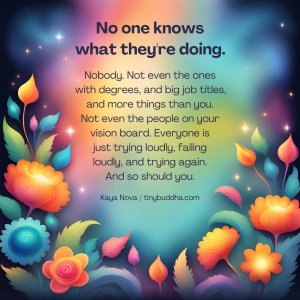“Uncertainty is the only certainty there is, and knowing how to live with insecurity is the only security.” ~John Allen Paulos
I used to love uncertainty. I wandered my way all around this country with little more than a suitcase and a journal. Committing to anything felt limiting, suffocating even.
One day I realized it wasn’t enlightenment that pushed me to embrace the unknown; it was a paralyzing fear of creating something certain. You can’t disappoint people when you don’t form relationships with them, and you can’t fail when you never start.
One day I decided to do the scariest things I could imagine: settle into one place, get a steady job, and start forming real relationships.
This lasted for a while until the economic meltdown rocked my world. Now I’m back in a place of uncertainty, like so many other people.
Almost everyone I know has had to make at least a few changes to their life because of the economy. People have lost their jobs, homes, and in some cases, their sense of identity.
It’s both terrifying and exciting to have a blank page in front of you. Sometimes we need reminders to see it as the latter.
Here’s how I’m learning to let go without losing what I felt I’ve gained these past few years:
1. Consider the idea of permanent uncertainty.
Certainty is actually an illusion. Think about it. Is there ever a time when you know for sure how things will unfold?
Even with the best preparation, you can’t control everything in the universe. Job security is subject to industry and company shifts. Relationships transform as people grow and change how they see the world and what they want out of it.
There are never any guarantees, even when you think you have it all figured out. When you don’t know what the future will hold, you’re actually dealing with life as it always is: yours to live and create moment by moment, day by day.
2. Stop waiting for something external.
In a post on Raptitude, David wrote about the theatrical convention known as Deus ex machina, or “God in a Machine.”
As David explains, it’s “a reference to the ancient playwright Euripedes’ dubious habit of using a pulley system to lower an actor dressed up as God onto the stage, to solve the problems of the characters and wrap up the story.”
We often wait for our own Deus ex machina in life—a big break or a soul mate who makes us feel complete. This allows us to believe there is something good down the line instead of actively creating that something.
The only sense of certainty we can experience in life is the result of our own efforts. That’s actually an empowering thought if you think about it.
3. See the benefits of releasing attachment.
If you’ve formed an attachment to something, odds are you’ve decided it’s a necessary component to your desired life—the home where you feel safe, or the relationship that gives you love and support. Now look at it from a different perspective. When you are attached to less, you open yourself up to more than you can imagine.
For example, I had to give up my apartment. I could have held onto the past, wishing I didn’t have to leave, or feel excitement about the potential for something even better. Corny, but true: a flower can’t grow if it clings to its roots.
4. Reconnect with the constants in your life.
Even though there are no guarantees, you likely have a few constants that won’t change in the near future: your health, your mental capacity, your family and friends.
At the end of the day, nothing matters without these things. You can have the best house in the world, but it becomes a prison if you’re alone. Your job may offer a million perks, but you won’t enjoy them if you’re not strong in mind and body.
Focus on those gifts, because that’s what they are. Even thinking about my gratitude gives me a profound sense of strength and humility. Two things I need right now.
5. Accept constant imperfection.
I think a lot of people have this illusion that someday everything will be okay. One day they’ll have the home, the relationship, the career, the status, and from then on it will be smooth sailing. I know if I’ve indulged this fantasy.
This causes us to metaphorically hold our breath, waiting for that moment when we’re finally able to be happy.
If we can accept, however, that things will never be perfect—that we’ll gain, and lose, and grow, and regress, and smile, and cry, and learn, and forget—we’ll be better able to embrace the present moment. We are all ever-changing works in progress, and so are the lives we lead.
No matter how much you’ve learned or how strong you’ve become, on any given day you could allow your emotions to get the better of you. Applying knowledge never gets easy; it always takes strength, humility, and mindfulness to be truly present and to forge ahead despite your fear.
I’m working on that today. Can you relate?
About Lori Deschene
Lori Deschene is the founder of Tiny Buddha. She’s also the author of Tiny Buddha’s Gratitude Journal, Tiny Buddha's Worry Journal, and Tiny Buddha's Inner Strength Journal and co-founder of Recreate Your Life Story, an online course that helps you let go of the past and live a life you love. For daily wisdom, join the Tiny Buddha list here. You can also follow Tiny Buddha on Facebook, Twitter, and Instagram.
- Web |
- More Posts














 Though I run this site, it is not mine. It's ours. It's not about me. It's about us. Your stories and your wisdom are just as meaningful as mine.
Though I run this site, it is not mine. It's ours. It's not about me. It's about us. Your stories and your wisdom are just as meaningful as mine. 